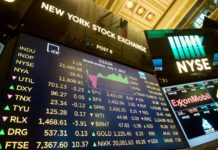Online brokers lowered their stock and ETF commissions in October to $0 – yes, zero.
So, is now a great time to get rich buying and selling, since that’s now free?
Please . . . Don’t.
Just. Do. Not.
Really.
Almost All Online Brokers Have Eliminated Commissions for Buying and Selling Equities and ETFs
TD Ameritrade. Ally Invest. Charles Schwab. E*Trade. Fidelity. Robinhood.
Trade Station still charges $5 for orders through their analytical platform, but $0 for TSgo.
Some of them still do charge something for options and over-the-counter penny stocks.
Gee, that’s sure nice of them, isn’t it?
Yes, that’s sarcastic. You’re a customer, not their favorite charity. They didn’t eliminate the most common commissions to make YOU rich.
They want to sucker “inactive” customers into buying and selling more stocks.
Remember Heinlein’s Law: There’s no such thing as a free lunch.
How We Got Here
Once upon a time, before May 1975, stock brokers were all required to charge the same fixed-rate commissions, and, by modern standards, those commissions were incredibly high.
Brokers who could convince their customers to buy and sell many times became wealthy off the commissions.
Some brokers became wealthy by gaining control of customer accounts, and then buying and selling without their knowledge, called “churning.” Whether or not the trades made money, the broker received their commission.
Over time, most customers became poorer.
The Securities and Exchange Commission wisely decided this was not in the best interest of customers, and eliminated the fixed fee structure.
Charles Schwab became the first discount broker, beginning May 1, 1975. Since then, the market has pushed commissions down, and that accelerated with the advent of the Internet and online investing platforms. It costs the brokerages almost nothing, except a tiny bit of electricity and exchange fees, to accept and process orders for trades.
Brokers Now Make Money Three Ways
One: Interest on Cash
When you open a brokerage account, you must deposit some money. Even though you’ll use most of it to buy investments, you’ll leave some of it in your account.
Your broker knows how to earn the most interest possible on that cash, using money market funds. Some will share a small percentage of that interest with you, but they keep the majority of it.
Some people are advising customers to invest their cash by buying short term money market ETFs, so you can earn all the interest you can for yourself, not for the broker. However, when you do that, the cash is not available to buy stocks or make other investments.
You need to get serious about managing your cash. Your brokerage account is not the place to park cash for the long term. If you plan to use it to buy stocks in the near future, fine. Keep it available. Otherwise, withdraw it and deposit it into a money market fund, certificates of deposit or Treasury bonds.
Two: The Bid/Ask Spread
Brokers are like antique dealers. They make money by buying low (bid) and selling high (ask).
If you buy a SPIDERMAN comic book for $50 today, then sell it back to the dealer tomorrow, you’ll be lucky to receive $30.
This makes a difference to you because when there’s a large bid/ask spread, you wind up paying more. And paying more reduces your investment returns. You too want to buy low and sell high. Buying high makes that harder.
There’s not a lot investors can do to affect this when you enter a market order.
The best advice is to stick to commonly traded stocks with plenty of liquidity, in markets where the bid/ask spread is only a penny or two.
Three: Margin Rate
When you buy stocks on margin, you’re borrowing money from the broker.
The brokerages that have eliminated commissions are now charging 9-10% on the margin money they loan out to margin investors.
The way to avoid paying this excessive rate is simple: don’t buy on margin.
Even if you didn’t have to pay such a high-interest rate, it dramatically raises your risk of losing money.
The Biggest Danger of Buying and Selling
You buy or sell at the wrong time.
You don’t know the future. I don’t either. Neither do all the economists and market experts.
If you listened to all the “OMG Trump’s election is going to destroy stocks and this bull market has already gone on too long and a big bad recession is coming” warnings, you’d have already sold your stocks – and missed the last two, three or four thousand point rises in the Dow Jones.
Buying and selling stocks without a clear plan that’s based on your goals and your situation makes you a sucker. Buying and selling based on the news means you give in to your fear and your greed.
Zero commissions just grease the rails to make your losses faster if you don’t have a plan or trading method in place.








